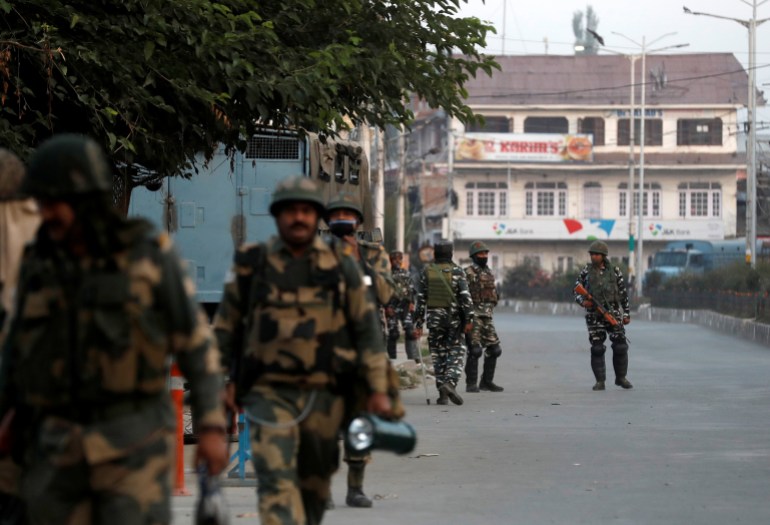India probes late Kashmir separatist’s family under terror law
Syed Ali Shah Geelani’s family booked under UAPA for allegedly raising anti-India slogans and wrapping his body in the Pakistani flag.

Police in Indian-administered Kashmir have opened a case against the family members of late resistance leader Syed Ali Shah Geelani under a harsh anti-terror law for allegedly raising anti-India slogans and wrapping his body in the Pakistani flag, officials say.
Geelani, who died on Wednesday at the age of 91, was the emblem of Kashmir’s defiance against New Delhi and had been under house arrest for years. The officials said they opened the case on Sunday.
Keep reading
list of 4 itemsWho was Kashmir’s Syed Ali Shah Geelani?
‘They snatched his body’: Syed Ali Shah Geelani’s pre-dawn burial
Kashmir separatist leader Syed Ali Shah Geelani dies at 92
His son, Naseem, told Al Jazeera the Indian authorities buried Geelani’s body in a local cemetery without any family members present after police snatched his body from the home. Police denied that and called it “baseless rumours” by “some vested interests”.
A video widely shared on social media purportedly showed Geelani’s relatives, mostly women, frantically trying to prevent armed police from forcing their way into the room where his body, wrapped in a Pakistani flag, was being kept.
The video showed women wailing and screaming as police took the body and locked his family and relatives inside the room.
Police said they registered a case against unspecified family members and some others on Saturday and began probing the case under the Unlawful Activities (Prevention) Act or UAPA. They have not yet been taken into custody.
In India, booking of a case by the police may not necessarily lead to a formal charge but is an incident that is officially recorded.
Critics say bookings under the vaguely worded UAPA legislation have been used across the country to intimidate or silence opposing voices, calling the law draconian.
The anti-terror law was amended in 2019 to allow the government to designate an individual as a terrorist. Police can detain a person for six months without producing any evidence, and the accused can subsequently be imprisoned for up to seven years.

Geelani’s son Naseem on Sunday said a police officer visited the family on Saturday and informed them a case had been registered. Naseem did not provide further details about the meeting but said there were scuffles as the police removed his father’s body.
“Amid the chaos, we didn’t really know what was happening. We were mourning,” said Naseem.
Kashmir has long been a flashpoint between India and Pakistan, which administer parts of the Himalayan region while claiming it entirely.
Geelani spearheaded Indian-administered Kashmir’s movement for the right to self-determination and was a staunch proponent of merging India’s only Muslim-majority region with Pakistan.
For many in Kashmir and beyond, he was an enduring icon of defiance against India.
Death is inevitable, but what followed after our old man passed away, has been horrifying.
Aba’s home was a jail for over a decade and now his graveyard is a jail too. #SyedAliShahGeelani
— Ruwa Shah (@ShahRuwa) September 4, 2021
In a tweet on Sunday, Pakistan’s Prime Minister Imran Khan slammed India’s removal and hasty burial of Geelani’s body as well as the case against the family, calling it “shameful”.
“Snatching the body of the 92 year old Syed Ali Geelani, one of the most respected & principled Kashmiri ldrs (sic), & then registering cases against his family is just another shameful example of India’s descent into fascism under the Nazi-inspired RSS-BJP govt,” Khan posted, referring to India’s governing Bharatiya Janata Party (BJP) and its far-right ideological mentor, the Rashtriya Swayamsevak Sangh (RSS).
India describes the armed rebellion as Islamabad’s proxy war and state-sponsored terrorism. Most Muslim Kashmiris consider it a legitimate freedom struggle and support the rebel goal that the territory be united, either under Pakistani rule or as an independent country.
Rebels have been fighting against Indian rule since 1989. The region is one of the most heavily militarised in the world. Tens of thousands of civilians, rebels and government forces have been killed in the raging conflict.

Tensions flared in the region in 2019 after New Delhi stripped Kashmir’s semi-autonomy, scrapped its statehood and removed inherited protections on land and jobs.
Authorities have since brought a slew of new laws, which critics and many Kashmiris fear could change the region’s demographics.
Meanwhile, on Sunday, authorities eased some restrictions that had been imposed since Geelani’s death, allowing private vehicles on roads and vendors to operate in some parts of Srinagar.
However, most shops and businesses stayed closed as government forces patrolled roads and streets in the city.
Mobile phones were restored late on Friday but mobile internet and restrictions on the assembly of people continued in many parts of the Kashmir valley.
Paramilitary soldiers remained stationed outside the graveyard where Geelani was buried.
Ruwa Shah, Geelani’s granddaughter, wrote on Twitter they were horrified by “what followed after our old man passed away.”
His “home was a jail for over a decade and now his graveyard is a jail too,” she wrote.